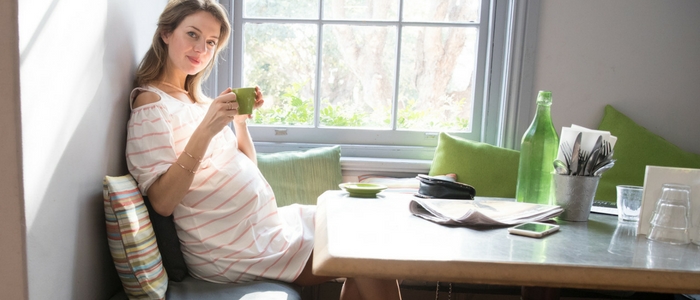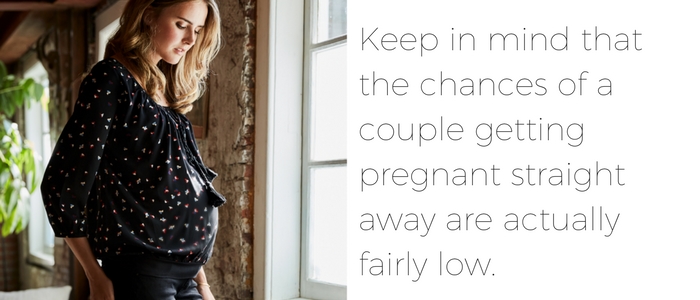
Trying to conceive a baby can be hard. We understand the difficulties, but also know that there are several factors that can influence when (and if) you are likely to fall pregnant.
Here we look some things you can do to improve your chances of conceiving and ensuring a healthy pregnancy, as well as a smooth delivery.
1. Discover the best time of your cycle
Generally, people consider ovulation as the most likely time to conceive during a cycle. However, having intercourse on the day of ovulation may be too late. Six days prior to ovulation is considered the best window of opportunity, and having sex as many times as possible during this time is believed to improve your chances of getting pregnant.
You can keep track of your period to predict these windows by keeping a chart, regularly taking your body temperature and being aware of any discharges from your cervix. To help, there are now a variety of apps available you can download onto your phone - these handy additions do most the work for you and keep an accurate record of symptoms and phases of your cycle.
In addition, physical signs that you may be ovulating can include:
- Tenderness in the breasts.
- Abdominal bloating.
- An increase in cervical mucus.
- Cramping or pain on one side of the pelvis.
- A heightened sense of smell, taste or vision.
- An increased libido (desire to have sex).
Keep in mind that the chances of a couple getting pregnant straight away are actually fairly low (around 25% per month). It will normally take at least four months for a woman with no fertility issues to fall pregnant, which is why doctors recommend that you persevere for up to a year before considering fertility investigations.
2. Know the benefits of a healthy diet
It is commonly agreed amongst experts that a healthy diet can not only help to improve your chances of falling pregnant, but can also ensure a healthy pregnancy and smoother delivery as well.
Both partners in the relationship need to share this responsibility by eating daily servings of fruit, vegetables, grains and dairy products. It is also important to include foods containing Vitamin C and E, zinc and folic acid, as these are beneficial for producing healthy sperm in men and regular ovulation in women. Fish low in mercury such as salmon and tuna (both considered important for pregnant women and those trying to conceive) should be consumed once or twice a week.
Consult your general practitioner or doctor to recommend the best vitamin/mineral supplement to help increase the likelihood of conception and reduce the chances of neural tube defects in the baby (such as spina bifida).
3. Exercise to maintain a healthy weight and reduce stress
With a strong connection having been established over the years between obesity and low fertility, it is important to achieve and maintain your recommended body weight to maximise your chances of conception.
It’s best to establish a regular exercise routine, incorporating at least three 30-minute cardio exercise sessions into each week. Try to reduce anxiety and stress levels in your life, which have also been shown to have an influence on fertility.
In fact, a study of women experiencing fertility problems found that 55% of those who took part in a relaxation and stress reduction course had a viable pregnancy within 12 months, while only 20% of those who didn’t take part successfully fell pregnant.

4. Exclude any negative lifestyle habits
Along with bringing good influences into your life such as healthy food and regular exercise, it’s equally important to discard those lifestyle choices that could be detrimental to conceiving and enjoying a healthy pregnancy.
There is a strong link between smoking and reduced fertility in both men and women, and plenty of evidence that consumption of cigarettes, alcohol and recreational drugs can all harm a growing and developing foetus.
You may also want to reduce the amount of caffeine you consume, because while there is no definitive evidence that it has a detrimental effect on fertility, research results are mixed. It is best to be on the side of caution, with the peace of mind that you’re doing everything you can to give yourself the best possible chance of conceiving.
5. Consider your age
Fertility in women begins to decline from around the age of 21, with a slow decline until about 35, a faster decline until age 40, and then a rapid decline after that.
It’s valuable to consider your age because as your chances decrease, keeping on top of your windows of opportunity during a cycle, weight, diet and lifestyle become increasingly important. According to Huggies, the probability of conception for women after one year of trying to fall pregnant decreases in the following estimates as they get older:
- Aged 20 = 90%
- Aged 30 = 70%
- Aged 35 = 55%
- Aged 40 = 45%
- Aged 40+ = 6%
This decline in relation to age is mirrored in IVF treatments as well, with the rate of live births from a mother’s eggs decreasing with age at roughly the same rate as with natural fertility.
The one exception to this is using a donor egg from a younger woman. Even in their mid-forties, women who use donor eggs from women in their twenties or early thirties can achieve success rates of above 40%.
Be prepared and comfortable
Finally, while getting the right maternity clothing will not improve your chances of falling pregnant, positive thinking is a powerful force and it pays to be prepared for the likelihood that you are going to conceive at some stage.
So whether you wait or stock up early, along with all the relevant baby paraphernalia such as cots and prams, also consider the very best maternity wear to make your time during pregnancy and beyond as comfortable and stylish as possible.
Queen Bee has a huge range of maternity clothes for all kinds of occasions, with over 60 different brands of local and international maternity activewear, sleepwear, shapewear and nursery wear. Check out our fabulous range here.
